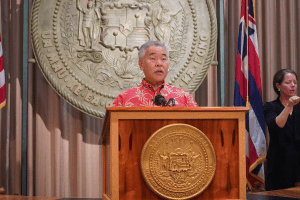 David Ige unveiled his Executive Supplemental Budget for 2021-23, requesting that the Hawaiʻi State Legislature continues to support crucial programs that aim to ease current challenges facing the State of Hawaiʻi.
David Ige unveiled his Executive Supplemental Budget for 2021-23, requesting that the Hawaiʻi State Legislature continues to support crucial programs that aim to ease current challenges facing the State of Hawaiʻi.
The state budget is the single most important document developed each year that addresses the state’s priorities. This supplemental budget request presents an action plan that addresses the issues of today and continues to make strategic investments toward improving the state’s social and physical infrastructure.
“This budget request is very different from budget requests of the previous two years, when we had to cut more than $1 billion, and all state agencies were forced to slash spending. This year, the economy has improved more quickly than anticipated,” said David Ige.
Current general fund tax revenue growth through the first five months of FY 22 has been $27.3%.
“That’s astounding. We’ve seen increased consumer spending, the rapid recovery of visitor arrivals, and healthy general excise and income tax collections. The increased revenues allow us to launch initiatives that are responsive to the pandemic and restore critical services that were previously reduced,” said Ige. “However, the pandemic brings much uncertainty, so while we’re cautiously optimistic, we must continue to prepare for unforeseen events and invest in a sustainable future for Hawaiʻi.”
OVERVIEW OF OPERATING/CIP REQUESTS:
The total Operating Budget from all methods of financing includes:
- $16.017 billion in FY 22. (This is .1 % less than the current appropriation of $16.040 billion.)
- $16.926 billion in FY 23. (This is 10.2% more than the current appropriation of $15.364 billion.)
For FY 23, the recommended General Fund adjustment to the Operating Budget is $8.701 billion.
- This represents a 12.2% increase, or $942.3 million, over the current appropriation level of $7.759 billion.
CIP BUDGET – State investments in critical infrastructure projects provide the best and most direct way to drive our economy and create jobs for our people. This supplemental budget request includes funding for education, transportation, clean energy, high-speed internet access and many other critical needs.
The proposed Capital Improvements Program for General Obligation Bond Funds includes:
- A slight decrease of $2.0 million in FY 22. This is .2% less than the current level of $984.8 million in FY 22.
- In FY 23, the administration is proposing an increase of $827.4 million. This is 281% more than the current total of GO bond funding of $294.1 million. This increase is high because of the Fiscal Biennium Budget appropriated CIP primarily in FY22 last Legislative Session.
BUDGET HIGHLIGHTS
Education – Both the Dept. of Education and the University of Hawaiʻi suffered significant budget reductions at the beginning of the pandemic.
“Last year, we were planning for furloughs. Today, we’re restoring and investing more than $689 million for public education,” said David Ige.
- This budget adds $100.2 million for various DOE programs to restore funding due to reductions during the pandemic.
- Adds $32.5 million for extra compensation for classroom teacher differentials.
“I’ve always been passionate about public education. Improvements to our educational facilities are some of the most important long-term investments we can make,” David Ige said.
- The administration is requesting $240 million additional funds in FY 23 for public school facilities – everything from deferred maintenance to health and safety projects and compliance. This will give a much-needed boost to the current appropriation, which is $26 million in FY 23.
- At the University level, the administration is requesting $86.5 million for modernization, maintenance, capital renewal/deferred maintenance, and technology renovations across the state. This will increase UH’s FY 23 appropriation to $189.1 million in FY 23.
University of Hawaiʻi – Medical Education – The pandemic underscored the need for more nurses and doctors, especially on the neighbor islands.
- To address the state’s doctor shortage, David Ige is requesting 20 permanent positions and $2.04 million to expand the John A. Burns School of Medicine’s residency program on the neighbor islands.
- To address the state’s nursing shortage, David Ige is requesting $1.75 million to support the University of Hawaiʻi’s nursing programs.
Medicaid Healthcare Payments – During the pandemic, the Department of Human Services provided help to hundreds of thousands of people who never thought they would need state assistance. Med-QUEST provided health care coverage to more than 100,000 additional individuals.
Medicaid now provides coverage for nearly 30% of the state’s population.
- This budget increases Medicaid health care payments by $15.9 million in general funds and $10.2 million in federal funds to provide additional home- and community-based services, extended post-partum benefits and expanded adult dental benefits.
Information Technology – The state’s reliance on information technology came to the forefront during the pandemic, which emphasized the need to develop an innovation economy in Hawaiʻi. The administration’s broadband initiative will form the foundation for this new economy.
- David Ige is requesting $33.3 million in ARP funds for Hawaiʻi’s state’s match so the state can receive additional federal funds through the Broadband Equity, Access, and Deployment federal grant. This would be the largest investment in Broadband, in state history.
- In addition, the Ige administration is lapsing ARP-funded CIP projects that were appropriated last year but do not meet federal guidance that was issued after the appropriations were made. The David is reappropriating $115.3 million in ARP CIP funding for statewide broadband projects pending U.S. Department of Treasury approval of our grant plan.
Housing – The demand for housing, including rentals, has reached critical proportions.
“The cost of housing is one of the most important quality-of-life issues my administration has tackled. We achieved our initial goal of building 10,000 new homes by 2020. And I believe we’ll have 3,000 more units by the end of 2022,” said David Ige.
- David Ige is requesting a $40 million cash infusion to the School Facility Agency for much-needed teacher housing in West Oʻahu and requesting a $40 million special funds authorization for the project.
- He is also requesting $5 million for statewide loan capitalization for the Department of Hawaiian Home Lands and asking for $10 million for DHHL lot development projects.
Public Safety
COVID-19 Response – This budget requests funds to continue to prioritize public health. The administration is adding:
- $61.8 million for Safe Travels, National Guard costs, and other COVID-19 expenditures.
- Over $30 million in state and federal funds to provide contingency funding for statewide COVID-19 operations.
- And restoring $5 million to the Major Disaster Fund.
Jails and Prisons – Every state in the nation has been reporting prison staffing shortages for many years, and the COVID-19 pandemic exacerbated the situation. COVID-19 outbreaks in our jails and prisons were alarming.
- This budget restores $17.6 million to fund 291.5 permanent positions in the Department of Public Safety. This will bring the department up to FY 2019 staffing levels.
- It adds 193 new positions, including 29 healthcare positions, to staff new wings currently underway that will address the chronic overcrowding problems on Hawaiʻi and Maui, as well as at the Women’s Community Correctional Center.
- This budget also adds 24 permanent positions to support law enforcement services on Oʻahu and Hawaiʻi.
- In addition, the budget adds 22 permanent healthcare positions to improve healthcare services in various correctional facilities. The need for around-the-clock nursing services and increased counseling was brought to light during the pandemic.
David Ige is also making a number of much-needed improvements to public safety facilities:
- $5 million for upgrades to the state’s emergency operations center,
- $21 million to replace the existing inmate management system for Public Safety facilities, statewide, and
- And $15 million to take the next steps in relocating Oʻahu Community Correctional Center.
Creating a cleaner, safer, and healthier Hawaiʻi
The pandemic reinforced the relationships between our people, place, and culture. From the beginning, the Ige administration made it a priority to create a cleaner, safer, and healthier Hawaiʻi. It has focused on protecting the state’s watersheds, better managing our oceans, creating a bio-security plan, doubling local food production, and moving toward 100% renewable energy.
This budget adds funds to support these projects:
- $10 million for the Royal Kunia Agricultural Park,
- $4 million for watershed protection, and
- $3.45 million for Maunawili and Kāneʻohe Pali acquisitions on Oʻahu.
Transportation
David Ige is also seeking to strengthen the infrastructure that supports Hawaiʻi’s communities. Using a mix of funding sources, the state will make needed improvements to airports, highways, and harbors across the state.
Additional Proposal
In addition to the requests made in this budget, David Ige will be submitting a separate spending bill to the Legislature to replenish the Emergency and Budget Reserve Fund.
“As we have seen with the pandemic, we must be prepared to weather the worst. We had built up the emergency fund prior to the pandemic, and we put the funds to good use in responding to it,” said David Ige.
David Ige said he will be proposing to deposit $1 billion into the Emergency and Budget Reserve Fund.
“My primary concern has been and will always be the health and welfare of Hawaiʻi’s people. Over the past seven years, we’ve worked to put the state on solid financial footing and set Hawaiʻi on a better trajectory. This budget continues to invest in Hawaiʻi’s future. It allows us to continue on a path where Hawaiʻi’s children have all the opportunities they deserve. And it will allow them to choose, and want to choose, to call Hawaiʻi home,” said David Ige.
ATTACHED:
Link to News Conference Slides
Budget in Brief: https://governor.hawaii.gov/wp-content/uploads/2021/12/2112109-BUF_Budget-in-Brief-FY-23-BIB.pdf
Executive Supplemental Budget for Fiscal Biennium 2021-23: https://governor.hawaii.gov/wp-content/uploads/2021/12/2112109-BUF_Budget-in-Brief-FY-23-BIB.pdf



